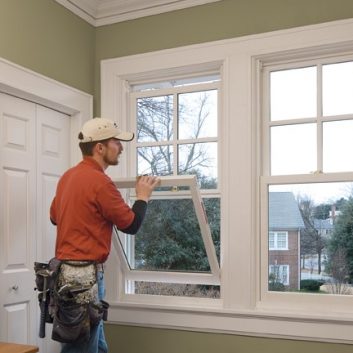How to Fix a Leaky Window
By: Architectural Visions
While spring brings warmer temperatures, it’s also known for its spring showers. High amounts of rainfall can shed light on issues in your home, such as windows that leak. Leaky windows aren’t an issue to ignore because leaky windows can lead to many other problems in your home. Unfortunately, some of these problems come with a higher price tag than what it would have cost to simply fix the leaky window. Read on for insight on issues leaky windows cause, common causes of leaky windows and how to fix a leaking window.
Key takeaways of leaky windows:
- Leaking windows can cause many issues and hazards, such as window rot, floor damage, foundation issues, mold and increased heating and cooling bills.
- Many reasons can cause windows to leak. The age of the window, normal wear and tear, faulty installation and poor maintenance are several leading causes.
- Some window repairs can be done at home, such as recaulking the windows to prevent moisture from entering.
- Other window repairs, such as replacing the entire window, should be done by an experienced professional.
Issues Leaky Windows Cause
Leaking windows can cause a host of issues and hazards. For example, when water enters through the window, it can result in window condensation, as well as water pooling around the windows. This moisture can result in damage to the structure of the home, such as rotted window frames, damage to the floors, and a compromised foundation. Leaking windows can also result in increased heating and cooling bills, as air can enter and exit through these same leaks. While a leaking window may seem like a minor inconvenience, the resulting damage can be costly.
Moisture that enters a space and can’t escape, especially if there is warmth, can result in mold. Mold may begin by discoloring the window and the surrounding materials. Eventually, the mold can expand throughout the walls. This level of mold in a home can cause health issues.
Leaking windows can also damage the structures surrounding the windows. This is especially an issue if the windows are wood. The excess moisture will cause warping and the paint to peel.
Common Causes of Leaky Windows
Many reasons can cause windows to leak. The age of the window, normal wear and tear, faulty installation and poor maintenance are several leading causes.
Wear and tear
When windows begin to leak, wear and tear may be to blame. One element of wear and tear is the sealant breaking down. You can identify this if there is condensation around the edge of the window during a rainstorm. Or, you can try spraying the window with a hose to determine if water enters through the window. Discoloration on the sealant is another way to identify this as the cause. An additional element of wear and tear is the window hardware not working. If the window won’t shut all the way, replacing the window hardware is an inexpensive, easy fix.
Bad glass seal
If water appears in between the panes of glass, it may mean there is a bad glass seal. While water may not come into your home, this still means the windows no longer have the insulating gas. This means the windows will be less energy-efficient than they were previously, which will result in higher heating and air conditioning bills.
Cracked sealant or caulk
Cracked window sealant or cracked caulk also can also result in leaking windows. As a temporary solution, you can re-caulk the window to see if the windows stop leaking during the next rain shower.
Poor installation
If wear and tear doesn’t seem to be the issue, the leaking may result from poor installation. This can mean that the window wasn’t properly fitted or the nails don’t resist corrosion. This likely will result in the window needing to be repaired or replaced entirely. Hiring a professional will ensure the windows are installed correctly to prevent future installation issues.
Wall leaks
Sometimes, wall leaks are mistaken for leaking windows. If there are water stains on the top of the window frame, the leak may be in the wall. Inspect the walls for cracks, and re-seal them if you discover any issues.
How to Fix a Leaky Window
There are some window fixes you can complete yourself, while other fixes will require the help of a professional.
Recaulk the windows
Researching how to caulk windows can help you if the leaking issue is minor. Caulking helps seal the windows, so applying clear caulking material around the window seams should help prevent water from entering. If this doesn’t resolve the issue, you may need a professional window repair or window replacement.
Reapply the sealant
If the leaky window is caused by damage to the sealant, you can likely repair this without a professional. This requires you to strip the sealant, and once the area is cleaned and dry, you would reapply the sealant evenly. If you’re not up for the task, you can always call a professional to handle this for you.

Window Replacement Process
Replace the window
Often, a leaking window requires a replacement. A window replacement is a reliable way to ensure the window will stop leaking. Contacting a professional to replace the window will protect your home from moisture and its associated hazards and help lower your energy bills. In addition, choosing a window in a water-resistant material, such as fiberglass, will help safeguard your home from leaks. Fiberglass is resistant to moisture and corrosion, which prevents leaks and rot. Ultrex Fiberglass Windows are known for their ability to stand up to moisture.
AVI Windows & Doors
Turn to a professional to help you solve your leaking window issues by contacting the experts at AVI. AVI is your one-stop-shop for all types of windows, with in-person and online service options. Please don’t hesitate to contact us online or come by one of our Southeast locations and let us help you!

